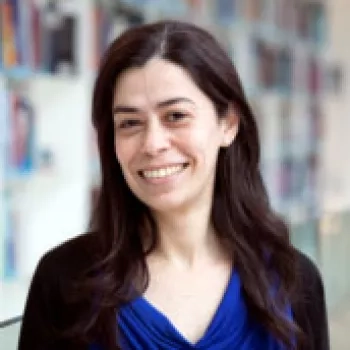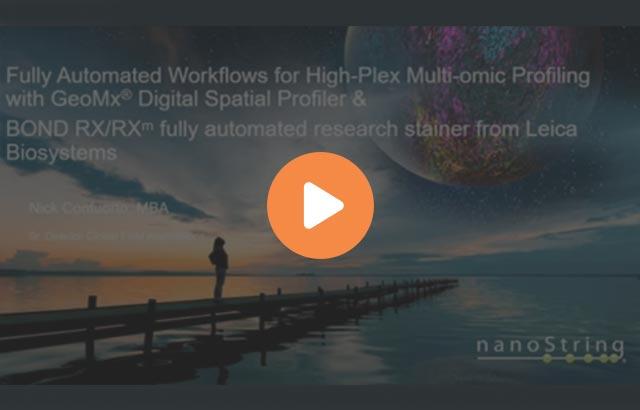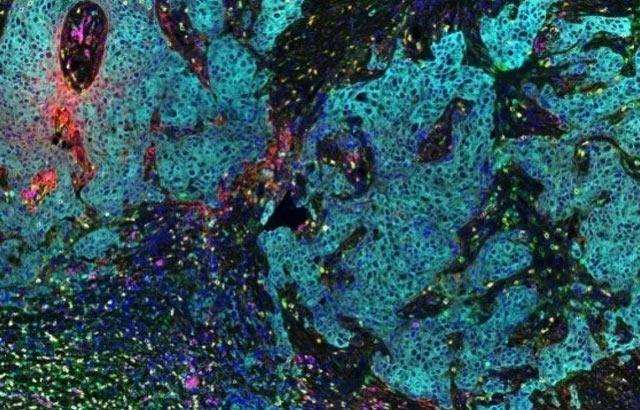Characterization of the Pancreatic Tumor Microenvironment using Novel Quantitative Multiplex DSP

Pancreatic ductal adenocarcinoma (PDAC) is a highly aggressive disease associated with poor outcomes. So far, the factors and pathways underlying patient survival in PDAC are unknown. However, the location, number, and characterization of immune cells that infiltrate PDAC tissue provide crucial information.
In this webinar, Dr. Dana Adel Mustafa, assistant professor and group leader of the Tumor Immuno-Pathology (TIP) Laboratory at Erasmus University Medical Center, shares how using the GeoMx® Digital Spatial Profiler (DSP) to measure PDAC tissue samples can reveal the key immune-related players that drive survival in PDAC patients. Mustafa explains how this technology enabled high-plex proteomic analysis of formalin-fixed, paraffin-embedded samples with spatial resolution. Mustafa also shares that higher B cell infiltration in PDAC tissue samples is associated with higher infiltration of T cells and higher antigen presentation, resulting in better prognoses.
Learning Objectives
- Learn how to extract the maximum information using the minimum amount of samples
- Understand why we need more than just numbers to tell the whole story
- Appreciate how precise tissue navigation leads to precise medicine
About the presenter

Dana Adel Mustafa is a biologist and a cancer researcher at Erasmus medical Center, Rotterdam, The Netherlands. She mainly studies two of the most deadly cancers: pancreatic cancer and brain tumors. Her research aims to reveal the immune regulation and infiltration in various types of cancers. In addition, her group focuses in identifying circulating biomarkers for detecting the response to therapy. She is interested in cancer metabolism, and in connecting the metabolic and genomics maps. She has been using various -omics technologies to identify the new prevention targets. Following by the state-of-the-art organ-on-a chip and organoid models to validate the usefulness of the new discoveries. Working with and for people like patients and students is dr. Mustafa's drive. Therefore, she became an assistant professor and a group leader of the Tumor Immuno-Pathology (TIP) lab in 2017. She became a member of a big consortium of Oncolytic Viro-Immune therapy (OVIT) to create new therapeutic options for cancer patients. Dr. Mustafa strongly believe that we can make progress in the battle against this disease by extensive collaboration between various people, disciplines and institutions.
Related Content
Die Inhalte des Knowledge Pathway von Leica Biosystems unterliegen den Nutzungsbedingungen der Website von Leica Biosystems, die hier eingesehen werden können: Rechtlicher Hinweis. Der Inhalt, einschließlich der Webinare, Schulungspräsentationen und ähnlicher Materialien, soll allgemeine Informationen zu bestimmten Themen liefern, die für medizinische Fachkräfte von Interesse sind. Er soll explizit nicht der medizinischen, behördlichen oder rechtlichen Beratung dienen und kann diese auch nicht ersetzen. Die Ansichten und Meinungen, die in Inhalten Dritter zum Ausdruck gebracht werden, spiegeln die persönlichen Auffassungen der Sprecher/Autoren wider und decken sich nicht notwendigerweise mit denen von Leica Biosystems, seinen Mitarbeitern oder Vertretern. Jegliche in den Inhalten enthaltene Links, die auf Quellen oder Inhalte Dritter verweisen, werden lediglich aus Gründen Ihrer Annehmlichkeit zur Verfügung gestellt.
Vor dem Gebrauch sollten die Produktinformationen, Beilagen und Bedienungsanleitungen der jeweiligen Medikamente und Geräte konsultiert werden.
Copyright © 2024 Leica Biosystems division of Leica Microsystems, Inc. and its Leica Biosystems affiliates. All rights reserved. LEICA and the Leica Logo are registered trademarks of Leica Microsystems IR GmbH.



